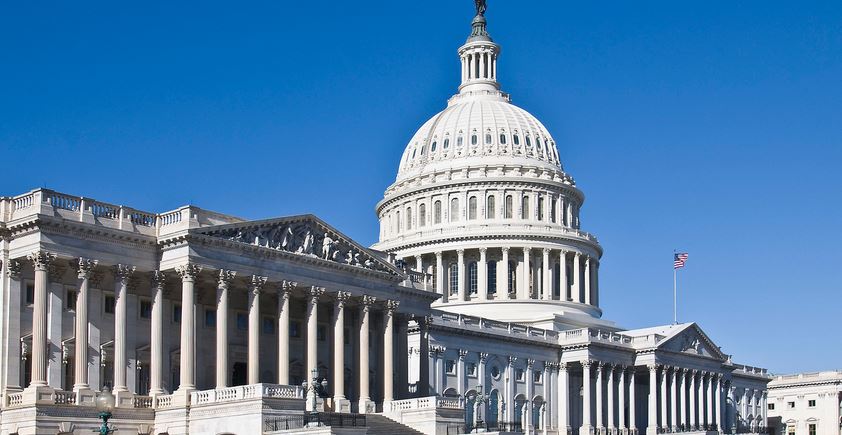Congress Is Old. Here's A Group Trying To Change It

By:
The Millennial generation is on track to becoming the largest living generation, but only a handful of these individuals are serving in the House of Representatives. That's one of the many reasons David Burstein, a Millennial writer, filmmaker, and nonprofit young voting engagement organization founder, is trying to get young people to run for Congress in 2016. Burstein, who has made two documentaries about young people in politics and America, recently launched political consulting firm Run for America (RFA) in hopes of finding talented Millennials (as well as non-Millennials) to campaign for seats in Congress.
Earlier this week, RFA posted an opening for United States Congress on LinkedIn to draw the attention of Millennials who might be up to the task in January 2017. Because so many young people use LinkedIn, Burstein told ATTN: he received a high volume of responses to the ad. Speaking to ATTN: about RFA's determination to put Millennials in Congress, here's what he had to say about RFA's efforts at shaping the 2016 election.
Editor’s note: this transcript has been edited for clarity and conciseness.
You wrote a book about Millennials. Did that process inspire you to start this movement or was it something else?
This really goes back to the 2004 election cycle when I had been frustrated with the fact that young people hadn't turned out to vote. So I made a film, which we brought out in the 2008 election cycle around the importance of getting young people to vote. One of the things that I heard as we were traveling around was people being really excited about wanting to participate and be part of making meaningful change in politics. People kept saying, "You know, I really wish that there were better people to vote for." There was what I saw as a hunger for a different kind of candidate, and the more I thought about it, I realized that it's really important for us to invest in people because in every industry in our world, we look for talent. We spend $75 billion in the U.S. annually on talent recruitment, identification, and retention and we have no kind of comparable process when it comes to politics. We basically say the requirements are how much money you can raise and how many political connections you have. And great, if you can check those two boxes, you can run. So this is really investing in talent if we want to get our problems solved in politics.
Run for America/LinkedIn
I've been reading a lot about RFA and learned that you're currently trying to recruit for new members of Congress on LinkedIn. What sort of responses have you seen so far?
It's really a broader effort than just necessarily on LinkedIn. We did this to highlight this talent problem that we're facing. We went on LinkedIn and posted a job that should be for every single member of Congress in the country with the creation of a job description, which is the first time anyone's every really done that when it comes to members of Congress. We put that together to show people that these are jobs that have very specific obligations and are ones that are incredibly compelling for a lot of reasons. It's great pay, you can have tremendous amount of impact over lives, so we posted that on LinkedIn, and we've gotten several hundred applications. But we're focused on also looking all across the country in districts in places where we've been talking to high school principals, guidance counselors, and newspaper editors to help find out who are the best and brightest in the community. We've been talking to networks all over the country to sort of help us identify these folks as well. So we're looking at the beginning of a national search which has never happened before to identify the most amazing people to help us help them run.
What are some of the next steps you plan to take for people who have potential? I've read that RFA is putting together a panel of experts to pick 12 candidates. What happens once people are selected?
We'll actually train these 12 folks and help run their campaigns, so we are effectively creating a new kind of political consulting firm to run campaigns in a high-quality, low-cost way. We'll do data polling, fundraising, legal, and advertising across the board and work with all these folks to help get them elected and raise money. So really we're recruiting folks that we're going to actually help win in November 2016.
Ron Cogswell/Flickr
Will there be fees associated with winning?
Yeah, so the way we are designed is actually structured as a benefit corporation. We're the first ever political consulting firm that is a benefit corporation. The idea is that we exist with a purpose to try and create impact. Most political consulting firms exist solely to try and make money and they don't care what you believe in or who you are as long as you pay their fee. We believe it's time for a new kind of political consulting which is leaner, more efficient across all of the different channels across different campaigns, and also to be able to deliver those services to candidates at a low cost and ultimately call into question other political consulting firms whether they should really be charging such exorbitant amounts of money for their services. It's actually one of the ways we hope we can address the question of campaign finance reform because one of the biggest drivers in cost on campaign finance reform are the fees that political consultants take. If you could actually lower those fees, you could start to make a big impact in that problem.
Is there a timeline for when the 12 winners will be picked?
We'll be going through that process throughout the rest of the year, and as the fall approaches, we'll be making an announcement about who these folks are.
Do you have a plan in mind for young people who might run in safe districts where it's the same party getting elected over and over again?
We've done a huge amount of data all over the country in congressional districts to identify where are opportunities that Jane Republican or Joe Democrat couldn't necessarily take advantage of. Part of our calculus is looking at all sorts of districts and looking at finding the right kind of person. All of our politics is based on the assumption that only 40 percent of people turn out and that the people who are really invested, young people, independents, moderates, minorities, the people who are sort of more middle class and working class, don't turn out in elections. The smartest people with the best ideas aren't doing that. We're really looking at how do we actually turn those people out. To turn different people out, you can reshape the electorate of districts all over the country.
Do you think putting young people in Congress means that young people will be represented in the country well?
I certainly think it is a problem that we have the oldest Congress in history right now. The median age is a little over 57 at this point. We still have very few people from our generation at the table, and we're the largest generation in history so I do think that there's a problem there.
I think it's really important that when we think of that, or any question whether it's age, gender, race, that we also have to be looking at the question of what these people bring to the table beyond that incredibly important representation and building a diverse body. How we bring to the table new skills, new backgrounds. Congress is made up of 80 percent lawyers and career politicians. There's no coder in Congress. There are no people who come from [different] backgrounds, except one or two people who are entrepreneurs, but very few that come from backgrounds that are really running things. Our argument is if you want to solve problems, you have to invest in people with a track record of leading something, building something, solving problems, being entrepreneurial, bringing people together, and thinking outside the box. That's the most important thing about what we're doing. Bringing those kinds of people into the mix.
What do you think overall Millennials can bring to Congress that's not there at the moment?
This is about the mindset of the leaders in this generation, which is that they are committed to an ideology of action: It's time to stop arguing and time to start getting done. We think that the government should have a responsibility to care for people, but we also want to get our nation fiscal help. These are common sense views. You can have both sides of the ideological spectrum and say "let's actually do something." That's really current in this generation. There's a whole new set of challenges that are part of the 21st century economy, and Congress doesn't understand that. A couple years ago, [the late, former Alaska Senator] Ted Stevens said the internet was a "series of tubes," and it's not a laugh line anymore. This is now a serious part of our national defense and our reality and we need people who have understanding of that.
How would you respond to someone who might say that people who want to run for Congress will do so anyway because they've always been interested in it and shouldn't have to be encouraged? In other words, are you concerned at all about potentially encountering people who might change their minds about the role?
I'm not particularly concerned about the latter part of that, but one of the things we have identified is that there's a big opportunity out there. There are a lot of people who are doing something else to achieve goals that were once only achievable by running for Congress. Twenty years ago, to make an impact on the world, people thought about getting an education, joining the Peace Corps, and going into politics. Today, people are starting a business or working in Silicon Valley as a way to make positive impact. People are seeing the ability to start their own organizations to go work for many, many other organizations. We're basically saying that we need to be the business in politics that is competing for the best and the brightest and to encourage those people to think about different ways to make an impact.
At its core, running for Congress is never going to be for everyone and it shouldn't necessarily be for every single person in the world, but it's time to start encouraging people who want to make impact to see politics as a viable option towards doing that. We need to actually start reining good people into a bad system. We look for people who are not particularly eager or excited at the beginning of the process because that's really what the story of our founding is. George Washington had to be convinced into becoming president.



